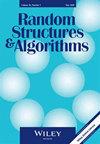Heilbronn triangle‐type problems in the unit square [0,1]2
IF 0.8
3区 数学
Q4 COMPUTER SCIENCE, SOFTWARE ENGINEERING
引用次数: 0
Abstract
The Heilbronn triangle problem is a classical geometrical problem that asks for a placement of n$$ n $$ points in the unit square [0,1]2$$ {\left[0,1\right]}^2 $$ that maximizes the smallest area of a triangle formed by three of those points. This problem has natural generalizations. For an integer k≥3$$ k\ge 3 $$ and a set 𝒫 of n$$ n $$ points in [0,1]2$$ {\left[0,1\right]}^2 $$ , let Ak(𝒫) be the minimum area of the convex hull of k$$ k $$ points in 𝒫 . Here, instead of considering the supremum of Ak(𝒫) over all such choices of 𝒫 , we consider its average value, Δ˜k(n)$$ {\tilde{\Delta}}_k(n) $$ , when the n$$ n $$ points in 𝒫 are chosen independently and uniformly at random in [0,1]2$$ {\left[0,1\right]}^2 $$ . We prove that Δ˜k(n)=Θn−kk−2$$ {\tilde{\Delta}}_k(n)=\Theta \left({n}^{\frac{-k}{k-2}}\right) $$ , for every fixed k≥3$$ k\ge 3 $$ .单位平方中的Heilbronn三角形型问题[0,1
Heilbronn三角形问题是一个经典的几何问题,它要求在单位正方形[0,1]2 $$ {\left[0,1\right]}^2 $$中放置n个$$ n $$点,以使由三个点组成的三角形的最小面积最大化。这个问题具有自然的普遍性。对于整数k≥3 $$ k\ge 3 $$,在[0,1]2 $$ {\left[0,1\right]}^2 $$中有n个$$ n $$点的集合,设Ak(纸牌)为集合中k个$$ k $$点的凸包面积的最小值。在这里,我们不考虑Ak(纸牌)在所有这样的选择上的最大值,而是考虑它的平均值Δ ~ k(n) $$ {\tilde{\Delta}}_k(n) $$,当n个$$ n $$点在[0,1]2 $$ {\left[0,1\right]}^2 $$中被独立且均匀随机地选择时。我们证明了Δ ~ k(n)=Θn−kk−2 $$ {\tilde{\Delta}}_k(n)=\Theta \left({n}^{\frac{-k}{k-2}}\right) $$,对于每一个固定k≥3 $$ k\ge 3 $$。
本文章由计算机程序翻译,如有差异,请以英文原文为准。
求助全文
约1分钟内获得全文
求助全文
来源期刊

Random Structures & Algorithms
数学-计算机:软件工程
CiteScore
2.50
自引率
10.00%
发文量
56
审稿时长
>12 weeks
期刊介绍:
It is the aim of this journal to meet two main objectives: to cover the latest research on discrete random structures, and to present applications of such research to problems in combinatorics and computer science. The goal is to provide a natural home for a significant body of current research, and a useful forum for ideas on future studies in randomness.
Results concerning random graphs, hypergraphs, matroids, trees, mappings, permutations, matrices, sets and orders, as well as stochastic graph processes and networks are presented with particular emphasis on the use of probabilistic methods in combinatorics as developed by Paul Erdõs. The journal focuses on probabilistic algorithms, average case analysis of deterministic algorithms, and applications of probabilistic methods to cryptography, data structures, searching and sorting. The journal also devotes space to such areas of probability theory as percolation, random walks and combinatorial aspects of probability.
 求助内容:
求助内容: 应助结果提醒方式:
应助结果提醒方式:


